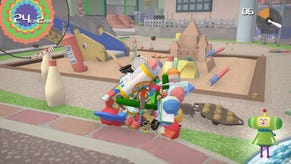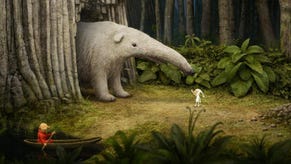Wot I Think: Botanicula
Save The Trees
Amanita's Botanicula is out in one hour, and you're going to like it very, very much. But, er, we recommend your hold off on purchasing it until 6pm. All the pics in this review can be clicked on for full-size versions, which if you've any sense will be gracing your desktop immediately. I've played it through and fallen in love, and you can find out why via the magical process of my saying Wot I Think:
My wife doesn't like games. I don't know what's wrong with her - perhaps she's missing a vital part of her brain, or maybe a copy of Arkanoids hit her on the head when she was a baby. Whatever the reason, it means that there's a fairly hefty gap in our interests, where I sit upstairs enjoying the vivid and wonderful worlds available in gaming, while she, er, I dunno, complains about stuff to the cat probably. So it says something pretty enormous about Botanicula that there was no doubt in my mind that she'd love it.
She loves it.
As do I. It's a ludicrously lovely thing, a celebration of joy and happiness, as five little plant-based creatures thwart the efforts of some malevolent spider-beasts to suck all the life-force out of their enormous tree. It's incessantly gorgeous, fixing an unflinching grin of glee on your face from start to finish, as you experience the onslaught of imagination and creativity from Amanita Design.
It's also an interesting diversion from the team's previous game, Machinarium. The robot adventure was quite a diversion from their usual style, and Botanicula brings things right back home, focusing more on exploration and experimentation with an organic world, rather than straight puzzles and narrative. Which is to say, you're given dozens and dozens of beautiful, living scenes, and you click on them to make cool stuff happen.
That's over-simplifying. There are puzzles here, but they're almost always about manipulating the environment, and the creatures that live in it, the game's crude inventory used only about five times throughout. It's much more about sweeping the mouse around the screen, watching as plants and animals react to it, spotting patterns, and gathering lost items. But the rewards come in spades, every tiny detail so lovingly created, and so joyfully presented, that Botanicula becomes a non-urgent experience of just playing.
Each scene, a static screen you explore for areas where the mouse becomes a cursor, is bursting with life. The tree's branches are arterial, flowing with organisms. Almost every bud or leaf will react to the mouse's being passed over it, while many will unfurl and deliver superbly funny animations when clicked on. Despite it being unknown if that reaction is part of a puzzle, or simply part of the playful experience, weirdly doesn't frustrate. Either because its behaviour is so winning, or because the craft behind the game manages to signal when there's no progress to be made.
That's not to say I didn't get stuck. Perhaps the one notably backward step from Machinarium is a lack of an in-built hint system, and while none of the puzzles are nearly as difficult as their last game, that doesn't mean it isn't frustrating when you're not sure what it was you missed, nor on which of the very many screens available at any point in the game. However, trying to actually articulate that frustration while be assaulted by loveliness is an interesting challenge. And importantly, I cleared the whole game without needing a hint - just persistence of exploration is enough. (Although I should note that a bug at one point did leave me stumped and annoyed - I've reported it, and hopefully it'll be gone from the released game.)
It won't come as a surprise to anyone familiar with any of Amanita's projects, from Samorost onward, that the music is not just exemplary and adorable, but also an integral part of the game. Fortunately, not in a way that's prohibitive to the more atonal player - there's no tiresome pattern repeating, for instance. Instead little play-puzzles may ask you to use timing to get a whole screen of apostrophe-shaped bird-creatures to harmonize together, by clicking on them all rather rapidly. The result is a wonderful sound, which is a sentence you can apply to just about every screen.
Everything reacts with noises, and most of them are created by humans. Buzzing, chirping, squawking and chattering are mostly mouth-made silliness, some I'm convinced done by what sound like an extremely entertained group of children. It adds charm like a bulldozer adds salt, amplifying the bursting happiness of the whole experience even further. And if it's not someone enthusiastically enunciating "BZZZZZZ! BZZZZZ!" then it's the soundtrack flitting from blisteringly cheery hand-claps to strange, organic grumblings and chirruping.
The music isn't by Amanita's usual Tomáš (Floex) Dvořák, who instead works as a production assistant on this project. This time it's by multi-instrumentalists, Bára Kratochvílová and Jan Kratochvíl, under the name DVA (that's Czech for Two). And it's a perfect fit. Matching Dvořák's style, but perhaps more varied, with greater extremes, it frequently reminded me of The Books in all the right ways, and I'm writing this while the soundtrack plays because there's little else I want to listen to just now. There's a reason Botanicula won the Excellence In Audio award at the IGFs this year. There's a reason nothing else stood a chance.
My only major criticism is the pacing. The game is divided up into large sections, each made up of around twenty separate screens, and for the large part this works extremely well. But it can leave things feeling a little wayward occasionally, and while it's a very satisfying length, the ending is peculiarly abrupt. It makes sense, you know you're reaching it, but the very final moment didn't make sense to me. Although saying that, it was still insanely delightful. And discovering that my score (I had no idea I was scoring as I played) unlocked extra little animations featuring the main cast was a fantastic bonus.
That's the sense you get throughout - constantly being offered little bonuses that only make things feel more happy. Occasionally as you play you'll find a section which requires selecting one of your five creatures to tackle a challenge. That's just a matter of clicking on the one you want. But the only sensible way to play is to try to guess which ones won't be the right choice, just so you can watch the gorgeous ways they fail.
There's no question over whether you should play this. Your $10 will buy you a few hours of utter joy, and flipping heck, why wouldn't you want that? It's infectiously lovely, smartly inventive, and plastered happiness all over my face. And even my game-ignoring wife's face, whom it was a pleasure to watch play. That's a high compliment.

























